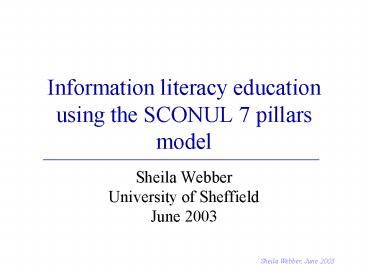Information literacy education using the SCONUL 7 pillars model - PowerPoint PPT Presentation
1 / 24
Title:
Information literacy education using the SCONUL 7 pillars model
Description:
to analyse their own information behaviour and start to identify ways in which ... Analysing & evaluating information collected ... – PowerPoint PPT presentation
Number of Views:339
Avg rating:3.0/5.0
Title: Information literacy education using the SCONUL 7 pillars model
1
Information literacy education using the SCONUL 7
pillars model
- Sheila Webber
- University of Sheffield
- June 2003
2
Outline
- Basics about the module
- Teaching and learning
- Assessment
- Thoughts
3
Basics
4
Changed URL!
7 pillars of information literacy
Source SCONUL. (1999) Information skills in
higher education a SCONUL Position Paper.
London SCONUL. http//www.sconul.ac.uk/pubs_stats
/pubs/99104Rev1.doc
5
The module
- Taken by students on BSc Information Management -
32 this year - Level 1 semester 1
- 20 credits (i.e. a third of what they do in this
semester) - 3 hours most weeks 1 hr lecture followed by 2
hours in computer lab - WebCT to support class
6
BSc IM
- Level 1 Info Lit Intro to IM Info Comm
networks in organisations 60 credits - Level 2 Info storage retrieval IM in the
learning organisation Info Systems Modelling
Database Design 40 credits - Level 3 Project methods IM project Info
Systems the Info Society IM management
strategy 40 credits
7
Aims Objectives
- to identify, evaluate and choose between key
information resources in a variety of media, - to start to develop their own conception of
information literacy. - By the end of the module students will have
learnt - to analyse their own information behaviour and
start to identify ways in which they can become
more information literate - to understand some information literacy models
and theories
8
- to plan a strategy for seeking information and
search for information in specific information
sources - to apply an evaluation framework to information
resources - to interact with an enquirer to identify what
they want and carry out a successful information
search on their behalf. - to communicate more effectively orally and in
writing
9
Learning and teaching
10
Introducing 7 pillars
- Week 1 7 pillars diagram plus explanation. In
lab, students break into groups and put together
ppt presentations on their Strengths and Areas
for Improvement in IL - Week 2 Groups present to the class. I can
respond to recurring comments like "what does
'Strategies' mean?" and highlight how "areas for
improvement" relate to forthcoming sessions
11
Our...
- Strengths
- Collating information
- Organising information
- Searching the internet
- Presenting information in an IT format
- Analysing
- Communicating within groups
- Areas of improvement
- Planning
- Evaluating
- Presenting
- Web design
Randeep Dhillon, Vickie Street, Phil Ryan, Olly
Jakes, Richard Francis, 2003
12
An example of Information Literacy
- Business Studies coursework which included
- Collating information
- Analysing evaluating information collected
- Researching using market reports, internet,
libraries etc. - Interact with management of companies.
- Comparing companies
- Present the information in various forms e.g.
diagrams, tables, reports and presentations.
Randeep Dhillon, Vickie Street, Phil Ryan, Olly
Jakes, Richard Francis, 2003
13
Types of activity
- Being set a topic (by lecturer, by student) to
search on - Identifying a topic to search on
- Doing before after mindmaps, individually and
in groups - Searching individually as part of group
- Comparing searches results done by different
groups - Evaluating resources individually, in pairs, in
groups - Presenting orally in writing, interviewing
14
Learning about
- Evaluation criteria
- Models of information behaviour
- Models of information literacy
- A librarian's perspective on information literacy
- Etc.
15
(No Transcript)
16
Assessment
17
- (10) Reflection on reference interview
- (50) Reflection on achievement in each of 7
pillars (1,500-1,750 words) plus portfolio of
evidence including - Before/after mindmaps
- Bibliography produced for student client
- Presentations
- Feedback from student client
- Anything else (e.g. other classes)
- (40) Examination
18
Reflection/ portfolio
- Aims
- To reflect on your understanding of information
literacy - To improve your information searching skills by
carrying out and evaluating a search for a
real-life client - To provide the client with relevant information
- To familiarise yourself with specific information
sources - Standard coursework feedback sheet individual
comments
19
Thoughts
20
- Some good thoughtful reflections/ portfolios
(average 63 for portfolio) - As expected, students see most scope for
improvement in pillar 7 - Better 7 pillars graphic scope notes aimed at
non-librarians would have been useful - Ideally, progress this through whole course
- If you tell students that infolit is important
give them marks for it, then they tend to think
it is important
21
- These seven pillars are perhaps the most
important thing that an undergraduate could know
about to aid effective research. - I feel that information literacy is an
ever-on-going process. There is no way to have
full complete knowledge of information literacy
due to the dynamic nature of the topic. This
makes the subject more attractive though, as
there is an innate need for knowledge as a human.
22
- I enjoy developing my information literacy and
it is one main reason I chose Information
Management. I will do more research to develop
my information literacy to a higher level in my
further study, and acquire more knowledge.
Because I believe that success is built up by
knowledge.
23
s.webber_at_sheffield.ac.ukhttp//dis.shef.ac.uk/lit
eracy/
24
http//ciquest.shef.ac.uk/infolit/






























